- Home
- Connie Shelton
The Woodcarver's Secret (Samantha Sweet Mysteries) Page 7
The Woodcarver's Secret (Samantha Sweet Mysteries) Read online
Page 7
“It is lovely,” Benedict said, descending the stairs and sending up a small prayer of hope that the shape of the box was not visible under his robe. He offered quick goodbyes, saying that he was needed at the monastery for midnight prayers. It wasn’t until he stepped out into the fresh air and walked around a corner from the Borega home that he breathed slightly easier.
The cathedral came into sight as the bells chimed their first long, full note. Then came a second. Benedict gripped the box through the fabric of his robe and began to run. Two blocks to go.
Two more chimes.
He dashed into the nave, looked around for the bishop but saw only a handful of priests and novices in prayer near the front.
Another chime.
He quickly passed down the side aisle and exited by the door to the cloisters. Three more chimes had sounded.
The covered walkway had never seemed so long but soon he was within sight of the bishop’s door. He tapped on it as the twelfth bell rang.
“I am glad you did not disappoint me,” said Andreas as Benedict fumbled through the pouch of the robe and withdrew the box.
* * *
Sophia knew, the moment she walked into her father’s studio, that the items on the table had been touched. The box—it was missing. A cry rose in her throat.
She lit two more candles and pawed through the items on the table. The lumps of pigment stone lay in a pile. All of Abran’s other supplies seemed to be in place. Had her father taken it to one of their bedrooms? She extinguished the extra candles and rushed up the narrow steps to the third floor. A light showed under her father’s door and she knocked before entering.
“No, hija, I have not seen it,” he said, drying his face at the washbasin. “I did not return to the studio after dinner.”
Dinner. The priest had excused himself shortly before everyone else left the table. Had he come upstairs? Sophia had passed through the great hall as the man was leaving and she distinctly remembered that his hands were empty as she bade goodnight to the Boregas. Tomorrow as she cleaned the rooms she would conduct a search, but she couldn’t let go of the feeling that the priest had somehow stolen it.
She fell asleep against a pillow damp with tears of frustration, her dream of using the box’s power to help others and to alleviate pain for them now dashed.
Gray dawn showed at the studio windows when Sophia made her way there after a restless night. She had clung to the half-hope that she had somehow been mistaken, but she could tell at a glance that the box was truly gone. The hours crawled as the household slowly rose and began to go about their day. By the time she began to tidy the rooms she found herself tired from the effort of staying awake.
Neither Miguel’s nor Maria’s bedchambers held any new items, as far as Sophia could tell, and although she looked especially carefully among the children’s things she had not really expected to find it there either. She went downstairs, offering to organize the cupboards in the dining room and in the great hall. The señora had gone out but the housekeeper seemed happy enough to have help from an unexpected source. The woman was dressed in the cloak she always wore on market days and she disappeared almost immediately.
Sophia gave the furniture a cursory dusting, focusing instead on any cabinet with space where the box might have been hidden. It was a hopeless quest almost from the start. The items in the dining room were familiar to her—candlesticks, vases and serving dishes used on an almost daily basis. The great hall contained everyday items as well.
The Boregas, she realized, were successful but not wealthy to the point of owning a lot of silly fripperies. She shoved a heavy wool blanket toward its place in a tall armoire but it didn’t seem to fit as it had before. She pulled the blanket out, deciding to refold it and try again. When her hand hit the rear of the cupboard, it resonated with a hollow sound. She stopped dead. Hidden compartments almost never meant anything good.
With a glance in each direction to be sure she was not being observed, she ran her fingertips around the back panel of the armoire. On the left edge of it, something loosened. The panel came away, revealing a space behind it, a place about four inches deep and the full width of the cabinet. But more startling than the fact the space existed was what it contained—a golden menorah, some candles and a parchment scroll.
Sophia knew she had discovered a very dangerous secret. She carefully slipped the wooden panel back in place and laid the refolded blanket on the shelf exactly as she had found it.
She found her father in the studio and suggested that they take a walk. Young Simón Borega wiggled off the chair where he posed and gave a wide smile as Abran agreed to dismiss him for the day.
“A walk? We do not often do such together, you and I,” he said as he cleaned his brushes. “Ah, it is market day. Perhaps you have something in mind you would like to purchase?”
“It’s not that, papá.” She picked up his cloak and draped it over his shoulders, steering him toward the door.
Outside, spring had returned giving them the perfect excuse for a walk along the river and away from the market crowds.
“Did you know the Boregas are Jewish?” she asked after telling him of the hidden items she had found.
He shook his head. “They are conversos, as are many in this land now.”
“But their Spanish names . . .”
“As are ours,” he reminded. “Changing my name from Abraham was not for my pleasure, hija, it was for my survival.”
It was true. Since the banishment of all Jews and Muslims who did not convert to Catholicism, the stories had become more frightening. Raids and arrests in one’s home, immediate imprisonment until trial, a trial that sometimes did not happen for many months. And after the trials—being burned at the stake was not an uncommon sentence.
Two young men walked toward them on the path and Abran squeezed Sophia’s arm, warning her to silence until they passed.
“Do not speak of this,” he hissed through clenched teeth. “Do not so much as entertain the thoughts. Anyone—any person at all—can make an accusation and we will find ourselves before the Inquisitor. Perhaps even Torquemada himself.”
“Surely we can trust the Boregas.”
“No more than they can trust us. You have no idea what a person will say under torture. Husbands have been known to give up their wives, mothers their own children.” He turned to look behind, in case someone might have come upon them. The pathway was clear. “Erase these thoughts from your head. Now!”
“But—”
“Once I finish the portraits, we shall find a way to leave. Perhaps get out of Spain to the north, over the mountains into France. But until then, I will not be paid except in small increments. We shall need all of our resources in order to make a journey of that length.”
Sophia considered this. It was more important than ever, she believed, to get the box back. With its power they would have a much better chance of safe passage, and with its power she could enter a new land with a skill that could help people. At a large copse of fig trees they turned and walked back toward the city center. Sophia forced herself to amble at the pace her father set, although in her heart and mind she wanted to race back, to confront the priest and demand the return of the box.
Those thoughts turned to horror as they saw a cloud of smoke from the center of the city. Nearing the market square they caught the stench of burning flesh and she realized with revulsion that the flames danced around tall stakes set in the ground, consuming the clothing of some poor man and woman.
* * *
Father Benedict smelled the bishop before he saw the man. An odor of foul smoke wafted into the library where the priest was meticulously drawing illuminations for a new biblical codex. He looked up from his work when a shadow darkened the open doorway. His nose must have wrinkled because the bishop spoke before Benedict said anything.
“Crypto-Jews. They were caught secretly reading the Talmud. And after renouncing that blasphemy and being baptized!”
&nb
sp; Andreas came close to the table. “This box?”
“Yes, eminence, I brought it back, as you asked.”
The bishop eyed the object suspiciously. “Did you not describe it as having brilliant stones on it? This one is not the same.”
Benedict felt his facial muscles freeze. He had not remembered mentioning the stones.
“Can this one perform miracles also?” Andreas snatched the box and held it up, examining all of its sides. He raised the lid and peered inside. “What are these traces of color?”
“I—I don’t know—”
Before he could think of a response, the bishop had turned toward the open door. He gripped the box with both hands, raising it toward the sun.
“Those gypsies have tricked you, but I am not so easily fooled. I shall find them and they shall pay.” He stepped out into the garden courtyard, lowered the box and looked inside it again. In a moment he spoke. “I can see them!”
Benedict had followed him outside. “What do you mean, ‘see’ them?”
The bishop’s eyes glowed. “I see that clan, the lot of them, living down in the barrio negrito. The women in their scandalous clothing, children running like wild creatures. Heathens!”
He held the box out before him and began walking, as if following a compass. Benedict trailed along.
The two men wound their way through twisting streets and narrow alleys, the neighborhoods changing as they left the church properties, then the upper-class merchants’ homes, then the small tiendas of the working class, finally passing through a low gateway to what had previously been the Jewish quarter before that group had been driven out and the itinerant sorts had moved in.
Four women with long, wild hair were sitting on short stools beside a stone wall, peeling oranges into a bowl. Nearby, several children ran and whooped. Benedict recognized one dark-haired boy as the one who had been healed by the old woman. As if a silent whistle had sounded through the group, they all looked up at the two clergymen. One woman shouted a single word.
The fruit bowl went flying—a flash of skirts, mothers grabbing at the hands of their children—and the gypsies scattered.
Andreas shoved the wooden box into Benedict’s hands and gave chase. Only one little boy was not quite so quick—the others got away. Andreas closed his fingers around the child’s arm and yanked him to a halt.
“Where are your parents?” he demanded.
The boy’s eyes were as wide as the full moon.
“Where! You must tell me!”
In a flash, the child’s fear switched to defiance. His small mouth hardened.
The bishop spun the boy around, grabbing both arms and lifting the lad from the ground. “Tell me! Where are they?”
The boy’s bladder let go and a yellow stream hit the cobbles, splashing the bishop’s soft leather shoes. He let out an invective and threw the child against the stone wall. The little one was stunned for only a moment before he scrambled to his feet and ducked into a tiny passageway, dragging one leg.
“Andreas! Did you need to injure him? Our Lord said—”
“Shut up!” The bishop stared at his ruined shoes, then spun and stomped back toward the cathedral.
Benedict trailed at a distance, a rushing sound in his ears, a sick feeling in his stomach. Had it really come to this? The effort to bring all citizens into the Church—and now people were being chased in the streets, forced to hide and to lie. Children being harmed by a man of God. He halted and stared down at the box in his hands. This was not right.
He began to formulate a plan. There were two boxes. He felt a new resolve as he resumed walking.
At the monastery, several people were gathered outside the bishop’s office. Among them, Benedict recognized Rodrigo Garcia, a successful merchant who had been most generous in his gifts to the Church. The man was shouting, his face livid. It took only a moment to realize that Rodrigo and his wife had been nearby when the incident happened with the child. An archbishop was listening intently. Benedict veered toward the sleeping quarters, seeking the sanctuary of his own small room.
Inside, he dropped the box on his thin mattress and fell to his knees. Help me, he prayed. Help me to right these wrongs. When he opened his eyes his gaze fell to the box. He took it between his hands and thumbed the lid open. A scene appeared, a moving tableau that showed the barrio where he and the bishop had been a short time ago. A door, once painted blue but now faded and chipped ... a narrow set of stone steps inside ... a room with primitive cooking facilities and a single loaf of bread ... another wooden box. The one with the stones attached to it. The box sat on a shelf. He knew somehow that it was the one the gypsy woman had used to heal.
Could it be that one box bestowed powers for good, the other for evil? Benedict had witnessed the bishop perform an evil act after staring into this box, the one he held now, and yet he felt no malice in his heart as he looked at it. Perhaps each box took on the personality and intentions of the holder. The one thing he did know—they held too much power to be out there in the hands of people who could wield it unthinkingly. He needed to obtain the other box and then he needed to destroy them both.
Someone tapped at his door. Hastily, he threw a blanket over the box.
“I am leaving for Rome in the morning,” Andreas said without preamble. He closed the door behind him and lowered his voice. “We will not speak of today’s events, you and I. Where is that carved box?”
“I do not know.” He shifted so that his robes blocked a view of the bed. God forgive me for the lie.
“What? Do you mean that you left it behind?”
“I suppose so. I do not remember.” And for the second one.
The bishop seemed agitated but he went away. Benedict remained in his cell-like room through supper and evening prayers, into the dark hours of the night when the monastery and cathedral became silent. Then he made his way quietly through the streets.
* * *
Sophia stood in darkness at the top of the stairs, listening to the soft voices below. A caller had arrived minutes earlier and Miguel stood talking with him. It was Rodrigo Garcia, a friend whose family socialized with the Boregas. Without revealing her presence, she caught only scattered words. Enough to know that the danger was closer than ever to this home. Apparently Garcia had done something today which now had the Inquisitioners looking into his business contacts and friends. Miguel said something about planning a holiday with the family.
“Do not tell me where you are going,” said the other man. “Go very quietly.”
It was the first Sophia had heard of a vacation. The portraits were not finished. Everyone, it seemed, was running scared. She tiptoed back to the third floor.
“Papá, we must go,” she whispered when they were alone in his bedroom. She explained the overheard conversation but did not mention her certainty that the priest had taken the carved box the previous day. The less said about the artifact, the better.
“I believe evidence is being gathered against us and against the Boregas. They will be unable to protect us.”
“But we have no money,” he protested. “I’ve not been paid for my work. How will we travel? Where will we live?”
“It will be all right. I am not sure how, but it will.”
He nodded. An artist’s livelihood was uncertain in the best of times.
“We can go back to Toledo,” he suggested.
She shook her head. “Not yet. The Inquisition is as active there, if not more so. It may be some time before we can return to our home.”
He seemed befuddled.
“Papá, let us go quietly to your studio. On the pretense that we are cleaning and organizing your materials, choose only those things you must have. We can probably walk out with my shopping bag, but it cannot appear that we are moving away.”
His eyes darted back and forth as he considered this, his forehead wrinkling and his chin quivering.
“Papá, be strong for me.” Yet, somehow, she knew that it was she who would need
to be strong for both of them. Wherever they stopped, perhaps in France, perhaps across the sea somewhere, she could find a midwife to apprentice herself to. She could learn the healing arts and find a way to support them.
The cathedral bells chimed midnight as they left the Borega house, keeping to the shadows as they made their way toward the edge of the city.
* * *
Father Benedict felt breathless as he closed his door and leaned against it. Two of the gypsy men had spotted him leaving their neighborhood. Attempting to outrun or outwit them in the maze of unfamiliar alleyways where they lived would have been foolhardy. He’d relied on his robes—both to conceal the stolen box and to bluster his way through with the voice of religious authority. They had trailed him nearly all the way to the cathedral.
He shoved the box with the colored stones on it under his bed, next to the other one, and moved his small trunk of possessions in front of them. Now, to find an implement he could use.
A team of builders had been working for months on a new porch for the rectory. Surely there would be a heavy stone at the site. He wound his way through the cloisters, into the nave and out a side door near the narthex. As expected, a pile of cut stones waited for the crew to arrive at daylight. He bent to pick up one, only to discover that the blocks weighed far too much. He looked for a smaller one.
At last he found one he could lift—and it would certainly do a fine job of smashing the wooden boxes—but if anyone were to see him struggling with the burden or to hear him carrying out the task in his room, there would be no sensible explanation. He should have brought the boxes to this location.
Retracing his steps, he retrieved the boxes and returned. Side by side on the ground, they looked benign enough. One could never guess the power that came from them. He picked up his chosen chunk of stone and managed to raise it to the height of his chest.
“What are you doing?”
The shout made his heart thud.
Bishop Andreas rushed across the moonlit work area, his white robe making him appear like a frantic bird. He stubbed his toe and let out an oath.

 Sweet Masterpiece - The First Sweet’s Sweets Bakery Mystery
Sweet Masterpiece - The First Sweet’s Sweets Bakery Mystery Sweet Magic
Sweet Magic Show Me the Money
Show Me the Money Escapes Can Be Murder
Escapes Can Be Murder Movie Mogul Mama
Movie Mogul Mama Deadly Sweet Dreams
Deadly Sweet Dreams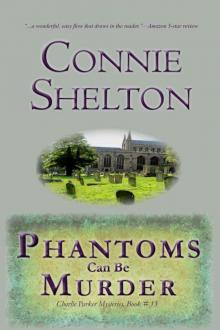 Phantoms Can Be Murder: Charlie Parker Mystery #13 (The Charlie Parker Mystery Series)
Phantoms Can Be Murder: Charlie Parker Mystery #13 (The Charlie Parker Mystery Series) Competition Can Be Murder
Competition Can Be Murder Sweet Holidays: The Third Samantha Sweet Mystery (The Samantha Sweet Mysteries)
Sweet Holidays: The Third Samantha Sweet Mystery (The Samantha Sweet Mysteries) Sweet Somethings (Samantha Sweet Mysteries)
Sweet Somethings (Samantha Sweet Mysteries)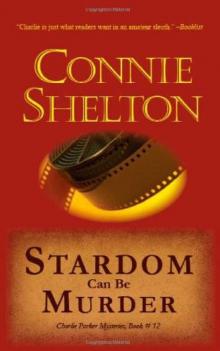 Stardom Can Be Murder: Charlie Parker Mystery #12
Stardom Can Be Murder: Charlie Parker Mystery #12 The Trophy Wife Exchange
The Trophy Wife Exchange Diamonds Aren't Forever
Diamonds Aren't Forever Sweet Masterpiece
Sweet Masterpiece Partnerships Can Be Murder
Partnerships Can Be Murder Partnerships Can Kill: The Third Charlie Parker Mystery
Partnerships Can Kill: The Third Charlie Parker Mystery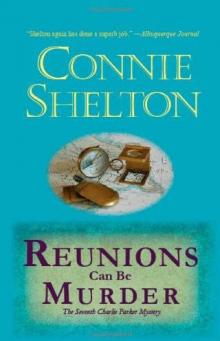 Reunions Can Be Murder: The Seventh Charlie Parker Mystery
Reunions Can Be Murder: The Seventh Charlie Parker Mystery Small Towns Can Be Murder
Small Towns Can Be Murder 8 Sweet Payback
8 Sweet Payback Obsessions Can Be Murder: The Tenth Charlie Parker Mystery
Obsessions Can Be Murder: The Tenth Charlie Parker Mystery 7 Sweets, Begorra
7 Sweets, Begorra Phantoms Can Be Murder: Charlie Parker Mystery #13
Phantoms Can Be Murder: Charlie Parker Mystery #13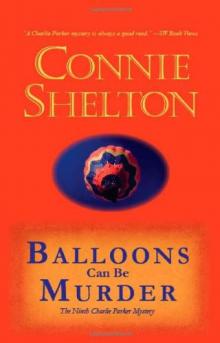 Balloons Can Be Murder: The Ninth Charlie Parker Mystery
Balloons Can Be Murder: The Ninth Charlie Parker Mystery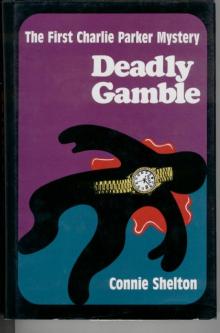 Deadly Gamble: The First Charlie Parker Mystery
Deadly Gamble: The First Charlie Parker Mystery Holidays Can Be Murder: A Charlie Parker Christmas Mystery
Holidays Can Be Murder: A Charlie Parker Christmas Mystery Sweet's Sweets: The Second Samantha Sweet Mystery ssm-2
Sweet's Sweets: The Second Samantha Sweet Mystery ssm-2 Sweet's Sweets: The Second Samantha Sweet Mystery (The Samantha Sweet Mysteries)
Sweet's Sweets: The Second Samantha Sweet Mystery (The Samantha Sweet Mysteries) Sweet Masterpiece - The First Samantha Sweet Mystery
Sweet Masterpiece - The First Samantha Sweet Mystery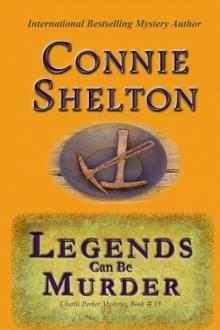 15 Legends Can Be Murder
15 Legends Can Be Murder Sweet Masterpiece: The First Samantha Sweet Mystery ssm-1
Sweet Masterpiece: The First Samantha Sweet Mystery ssm-1 Sweets Forgotten (Samantha Sweet Mysteries Book 10)
Sweets Forgotten (Samantha Sweet Mysteries Book 10)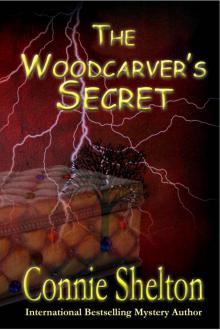 The Woodcarver's Secret (Samantha Sweet Mysteries)
The Woodcarver's Secret (Samantha Sweet Mysteries) Spooky Sweet
Spooky Sweet Alibis Can Be Murder
Alibis Can Be Murder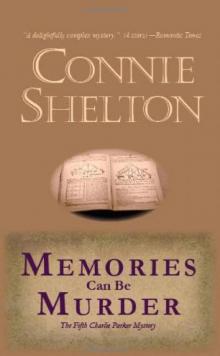 Memories Can Be Murder: The Fifth Charlie Parker Mystery
Memories Can Be Murder: The Fifth Charlie Parker Mystery Gossip Can Be Murder
Gossip Can Be Murder Honeymoons Can Be Murder: The Sixth Charlie Parker Mystery (The Charlie Parker Mysteries)
Honeymoons Can Be Murder: The Sixth Charlie Parker Mystery (The Charlie Parker Mysteries) Vacations Can Be Murder: The Second Charlie Parker Mystery
Vacations Can Be Murder: The Second Charlie Parker Mystery Sticky Sweet
Sticky Sweet Sweet Hearts
Sweet Hearts